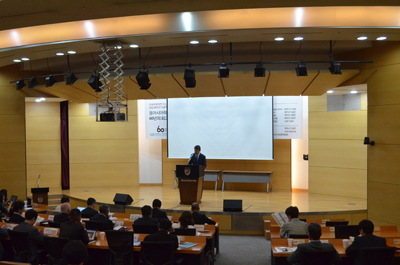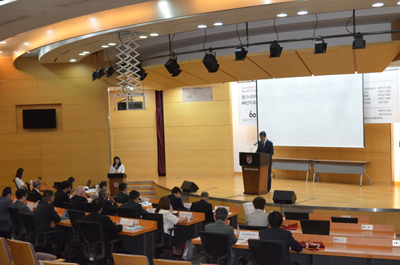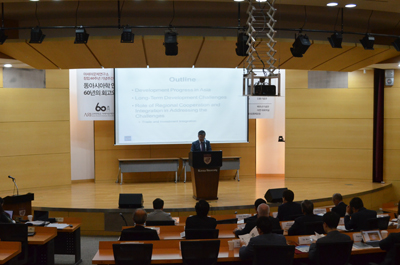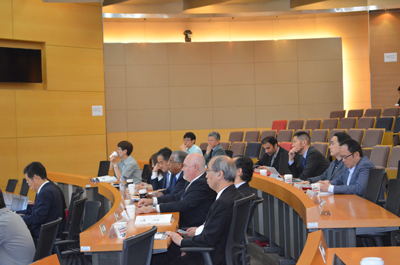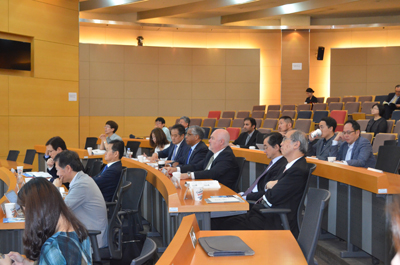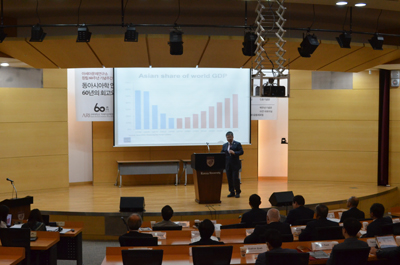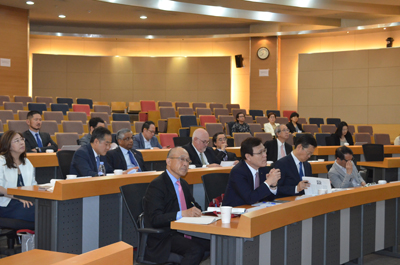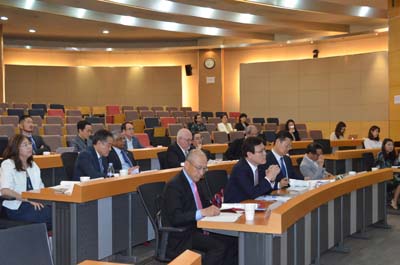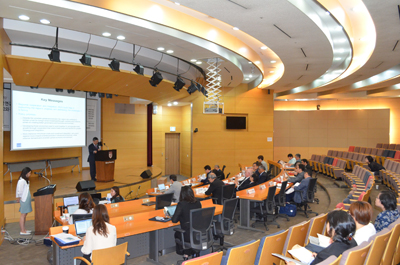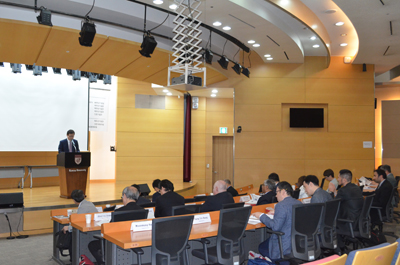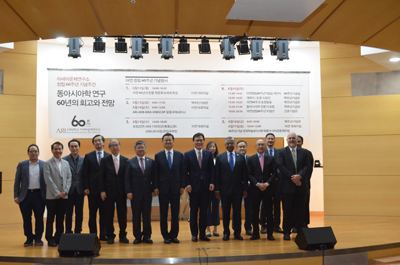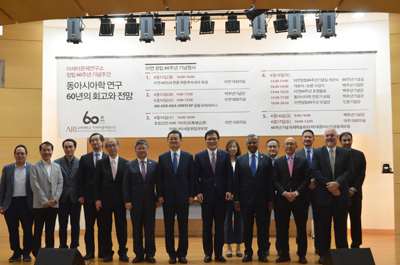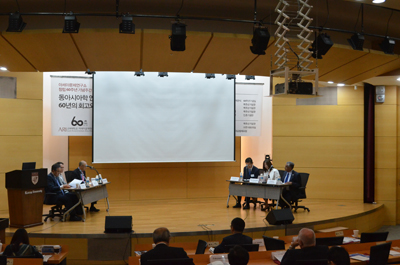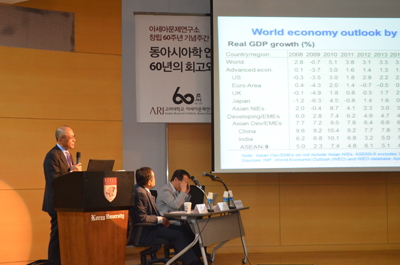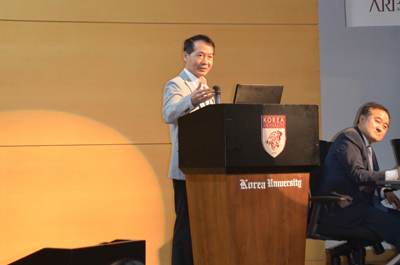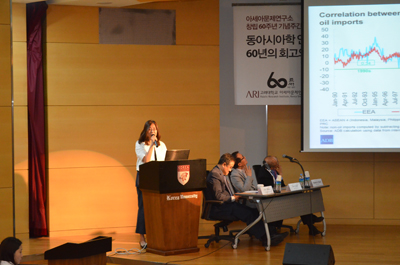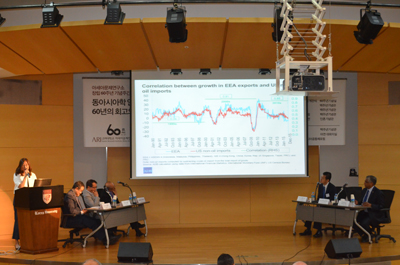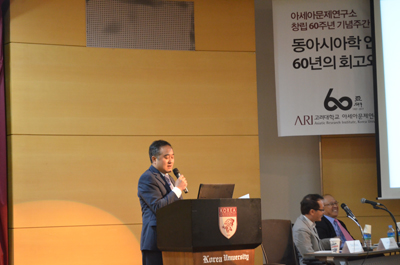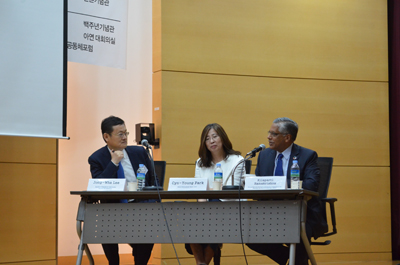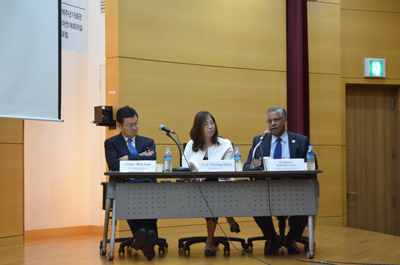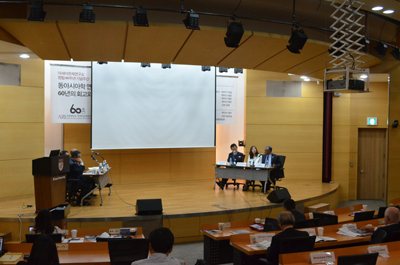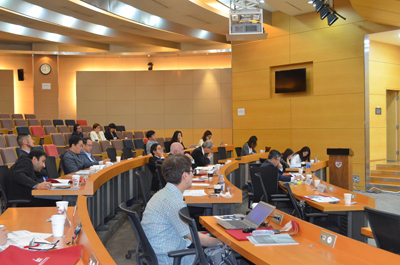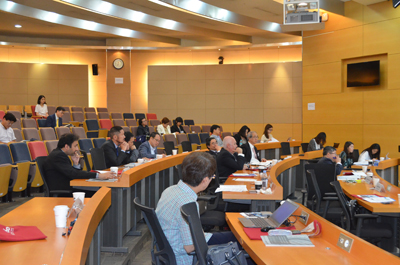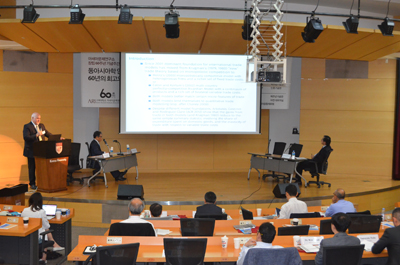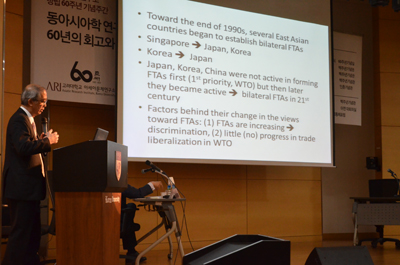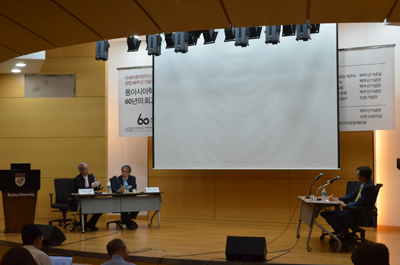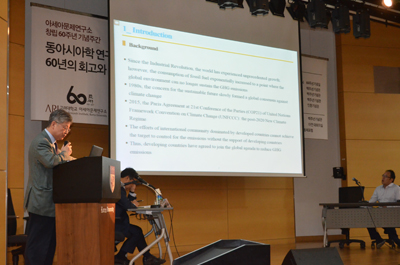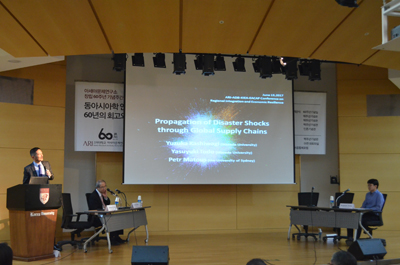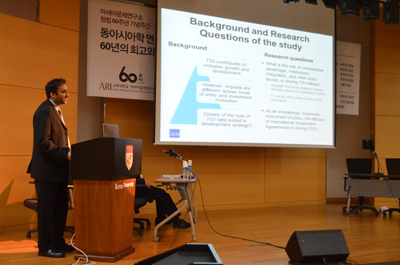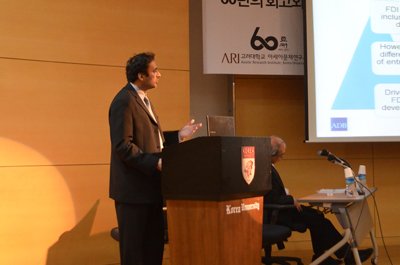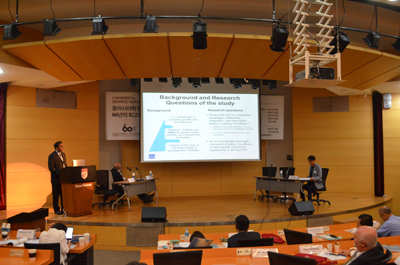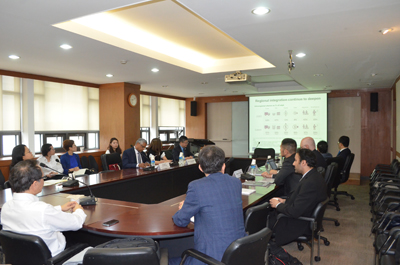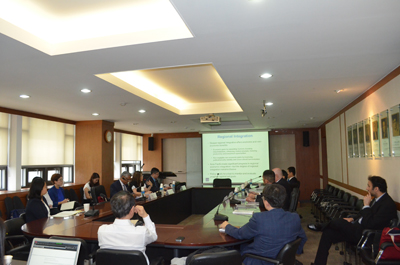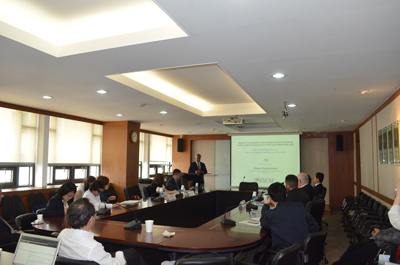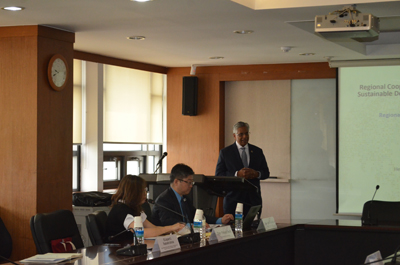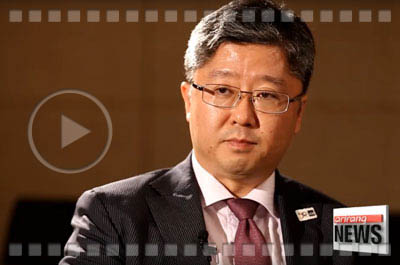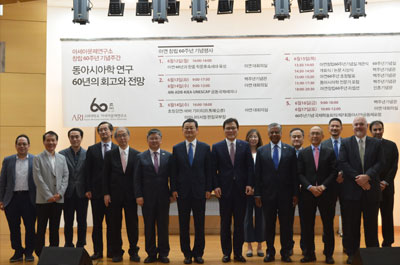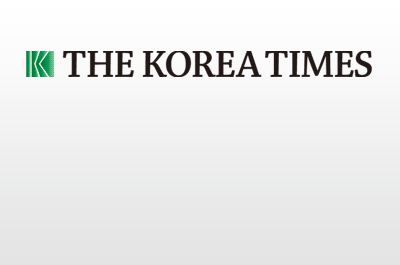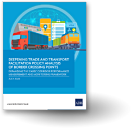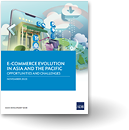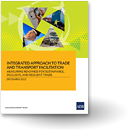

International Conference on Regional Integration and Economic Resilience
In partnership with the Korea International Economic Association (KIEA) and United Nations Economic and Social Commission for Asia and the Pacific: Subregional Office for East and North-East Asia (UNESCAP-ENEA), the Asian Development Bank (ADB) is co-organizing an international conference with the theme of Regional Integration and Economic Resilience on 13-14 June 2017 at the Asiatic Research Institute (ARI), Korea University. The conference will bring together academics, policy makers, and representatives from international organizations to discuss the prospects for international trade and regional integration in Asia and the Pacific under an increasingly uncertain global environment, and the role that trade and investment integration can play in bolstering economic resilience.
Hosted by Asiatic Research Institute, Korea University and co-organized by Asian Development Bank, Korea International Economic Association and UNESCAP-ENEA




Event details
Date/Venue:
- 13 June 2017
Centennial Memorial Hall, Korea University,
145 Anam-ro, Seongbuk-gu, Seoul, 02841, Republic of Korea - 14 June 2017
Asiatic Research Institute (ARI), Korea University,
145 Anam-ro, Seongbuk-gu, Seoul, 02841, Republic of Korea Contacts:
-
Korea University
- Moonsung Kang
Professor, Division of International Studies
Head, Center for Asian Cooperation, Asiatic Research Institute
Email: mkang@korea.ac.kr
- Ms. Hong-Eun Moon
Research Assistant, Asiatic Research Institute
Email: sybj2000@naver.com
- Fahad Khan
Economic Research and Regional Cooperation Department,
Asian Development Bank
Email: fkhan@adb.org
- Ms. Mara Tayag
Economic Research and Regional Cooperation Department,
Asian Development Bank
Email: mtayag@adb.org
- Ms. Pia Tenchavez
Economic Research and Regional Cooperation Department,
Asian Development Bank
Email: ptenchavez@adb.org
- Moonsung Kang
Download:
- Official Program
Program and Agenda
Centennial Memorial Hall, Korea University, Seoul, Korea

Registration / Opening
09:00–09:20 - Registration and Coffee
09:20–10:10 -
Opening Ceremony
-
Welcoming Remarks
 Jong-Wha Lee Director, Asiatic Research Institute, Korea University and President of Korea International Economic Association
Jong-Wha Lee Director, Asiatic Research Institute, Korea University and President of Korea International Economic Association
Notice: Undefined index: keynote in /var/www/vhosts/aricv7/content/events_regional-integration-economic-resilience.php on line 98
Notice: Undefined index: keynote in /var/www/vhosts/aricv7/content/events_regional-integration-economic-resilience.php on line 111
Notice: Undefined index: keynotefile in /var/www/vhosts/aricv7/content/events_regional-integration-economic-resilience.php on line 112
Jong-Wha Lee is a professor of economics and director of the Asiatic Research Institute at Korea University. He served as a senior adviser for international economic affairs to former President of the Republic of Korea. He was also previously Chief Economist and Head of the Office of Regional Economic Integration at the Asian Development Bank and an economist at the International Monetary Fund. He has taught at Australian National University, Harvard University and Peking University.
He has published extensively on topics relating to human capital, growth, financial crises, and economic integration in leading academic journals. His most recent books include Is this the Asian Century (forthcoming, World Scientific); Crisis and Recovery: Learning from the Asian Experience (World Scientific, 2016); and Education Matters: Global Schooling Gains from the 19th to the 21st Century, coauthored with R. J. Barro (Oxford University Press, 2015). He is a regular columnist for Project Syndicate. He obtained his PhD and Master’s degree in Economics from Harvard University.Bio Remarks
Distinguished speakers, guests, ladies and gentlemen.
On behalf of the Asiatic Research Institute (ARI) at Korea University and the Korea International Economic Association (KIEA) as well as our partners—Asian Development Bank (ADB) and United Nations Economic and Social Commission for Asia and the Pacific: Subregional Office for East and North-East Asia (UNESCAP-ENEA)—it is my great pleasure to welcome you to this timely conference on regional integration and economic resilience.
First of all, I congratulate ADB for its 50th anniversary of establishment. I am very grateful and privileged that ADB agreed to be our partner and co-organizer for this event.
Can Asia continue to achieve more resilient and more sustainable growth? This is a key question that this conference would like to address. There is no question that Asia’s standing in the global economy is stronger than ever. The region now produces about 40% of the world’s GDP, measured in purchasing power parity. During the recent global financial crisis, Asia accounted for more than half of global GDP growth. Add to that a massive population and growing political influence, and Asia finally appears open to so-called “the Asian Century”.
Despite growing positive signs from the upward trend of the US economy, the outlook for Asia remains uncertain. Protectionist measures and increase in US interest rate remain risk factors for the Asian economy. Shadow banking and corporate debt pose significant vulnerabilities and risks to the Chinese economy. Noting that in any case the region is unlikely to revert to its long-term growth potential as it had achieved prior to the global crisis without the support of a firm global recovery and tremendous efforts for improving structural weaknesses and productivity growth.
The latest global slump revealed the risks that the region may face from excessive openness and globalization. That over-dependency on external demand battered the region's exports and reduced capital inflows. There is no denying that the export-led growth has delivered enormous benefits for Asian economies, and will continue to do so for many years, but some economies in the region may have pursued export orientation strategy too excessively.
Against this backdrop, Asian economies must put in place safeguarding mechanism against excessive and unbalanced openness while embracing globalization. The region must thus try to make their economies more resilient through implementing a combination of policy measures that revitalize domestic demand and production as well as regional trade and investment.
Strengthening regional economic cooperation and integration will also benefit the whole Asia. The region itself is a large market which expands rapidly. Amid an emergence of nationalism and anti-globalization in the Western countries, intraregional trade and investment in Asia becomes more important than ever. Despite being deeply interdependent, however, the region’s countries still struggle to act collectively. Many cross-border issues, such as growing regional trade disputes and macroeconomic spillovers, justify deeper policy coordination. The region needs to continue to deepen and broaden economic integration and build a more durable cooperative framework that maximizes mutual benefits.
Over the course of the next two days, we will revisit some of these issues and more. I am confident that we will have interesting and fruitful discussions today and tomorrow. Thank you again for your participation and wish you all a stimulating conference.
Keynote Speech I Yasuyuki Sawada Chief Economist and Director General, Asian Development Bank
Yasuyuki Sawada Chief Economist and Director General, Asian Development Bank
Notice: Undefined index: remarks in /var/www/vhosts/aricv7/content/events_regional-integration-economic-resilience.php on line 95
Notice: Undefined index: remarks in /var/www/vhosts/aricv7/content/events_regional-integration-economic-resilience.php on line 110
Notice: Undefined index: keynotefile in /var/www/vhosts/aricv7/content/events_regional-integration-economic-resilience.php on line 112
Yasuyuki Sawada is the Chief Economist of the ADB and Director General of its Economic Research and Regional Cooperation Department. Mr. Sawada is the chief spokesperson for ADB on economic and development trends, and leads the production and dissemination of ADB’s flagship knowledge products, as well as ADB’s support for various regional cooperation fora such as ASEAN+3 and APEC.
Before joining ADB, Mr. Sawada was Professor of Economics at the University of Tokyo. He did research in a variety of institutions, such as the Japan International Cooperation Agency Research Institute and the World Bank, where he led a number of large-scale development policy evaluation projects in Asia and other developing countries.
His key research areas are macro- and micro-development economics, microeconometrics, economics of disasters, and field surveys and experiments. Mr. Sawada obtained his PhD in Economics and his Master’s degree in International Development Policy from Stanford University.Bio Keynote Presentation
Role of Regional Cooperation and Integration in Addressing Developing Asia’s Long-term Development Challenges—Key Messages- Over the past 50 years, rapid development has transformed Asia. From being the poorest region in the world, developing Asia has surged ahead over a wide range of economic and social indicators. It has emerged as a center of global manufacturing and technological innovation. In the short-term, economic growth is expected to remain robust at 5.7% in 2017 and 2018. If this trend continues, developing Asia’s per capita income could rise six-fold by 2050. Its share of global output would increase from 32% today to over 50%.
- Despite this dramatic progress, long-term challenges remain for the region to achieve inclusive and sustainable growth. These include (i) structural factors that have slowed growth in trade; (ii) large infrastructure gaps that continue to constrain economic development; (iii) increasing investment in human capital—particularly education and health; (iv) generating greater innovation and upgrading technology; (v) the stubborn challenge of poverty and income inequality; (vi) population aging in some of the region’s biggest economies; and (vi) deepening demographic and environmental challenges.
- Regional cooperation and integration (RCI) could help support the region’s progress and address the challenges it faces. RCI can help accelerate economic growth, reduce poverty and economic disparities, raise productivity and employment, and strengthen institutions. Development partners can play an important role in supporting RCI and connectivity.
- Developing Asian economies must work together to reinvigorate trade growth—through measures that reduce trade costs and improve the business climate, as well as cooperation to lower trade barriers blocking greater intraregional integration.
- Despite the uncertain global environment, the region can remain a magnet for foreign direct investment by instituting credible, consistent policy reforms that boost good governance and create an attractive business environment.
Keynote Speech II JongKu Choi Chairman and President, The Export-Import Bank of Korea
JongKu Choi Chairman and President, The Export-Import Bank of Korea
Notice: Undefined index: remarks in /var/www/vhosts/aricv7/content/events_regional-integration-economic-resilience.php on line 95
Notice: Undefined index: keynote in /var/www/vhosts/aricv7/content/events_regional-integration-economic-resilience.php on line 98
Notice: Undefined index: remarks in /var/www/vhosts/aricv7/content/events_regional-integration-economic-resilience.php on line 110
Notice: Undefined index: keynote in /var/www/vhosts/aricv7/content/events_regional-integration-economic-resilience.php on line 111
Bio Keynote
JongKu Choi is the 19th Chairman and President of The Export-Import Bank of Korea upon taking office in March 2017. Commencing his public service career in 1982, Chairman Choi accumulated decades of extensive experience by holding varied positions including Deputy Minister for International Affairs at the Ministry of Strategy and Finance (MOSF) and First Senior Deputy Governor of the Financial Supervisory Service (FSS). Most recently, Mr. Choi served as President and CEO of the Seoul Guarantee Insurance (SGI) from January 2016 to February 2017.
During and aftermath of the 2008 financial crisis, as Director General for International Finance Bureau, Mr. Choi contributed to stabilizing financial and foreign exchange markets in the Republic of Korea. While he was Deputy Minister for International Affairs at the MOSF from 2011 through 2012 when the global economy was facing the eurozone fiscal crisis, he committed himself to keeping the turbulence at bay to maintain the Korean market stable. He also played a role in effectively coordinating international cooperation amid the crisis, working closely with the partner countries notably the Group of Twenty (G20) and the ASEAN Plus Three (ASEAN+3), a cooperative platform designed for ensuring financial stability and economic integration in the region.
Born in 1957, Mr. Choi obtained a bachelor's degree in International Trade from Korea University in 1980 and a master's degree in Public Administration and Policy from the University of Wisconsin-Madison in 1992.10:10–10:20 Group Photo
Opening Roundtable:
Resilience of Asian Economies Under Changing Global Environment
10:20–12:10 - Review recent developments in the global and Asian Economy
- What are the effects of global protectionism on Asian economies?
- Discuss uncertainty and risks to global and regional economic integration and cooperation
Chair: Jong-Wha Lee Director, Asiatic Research Institute, Korea University and President of Korea International Economic AssociationBio
Jong-Wha Lee Director, Asiatic Research Institute, Korea University and President of Korea International Economic AssociationBio
Jong-Wha Lee is a professor of economics and director of the Asiatic Research Institute at Korea University. He served as a senior adviser for international economic affairs to former President of the Republic of Korea. He was also previously Chief Economist and Head of the Office of Regional Economic Integration at the Asian Development Bank and an economist at the International Monetary Fund. He has taught at Australian National University, Harvard University and Peking University.
He has published extensively on topics relating to human capital, growth, financial crises, and economic integration in leading academic journals. His most recent books include Is this the Asian Century (forthcoming, World Scientific); Crisis and Recovery: Learning from the Asian Experience (World Scientific, 2016); and Education Matters: Global Schooling Gains from the 19th to the 21st Century, coauthored with R. J. Barro (Oxford University Press, 2015). He is a regular columnist for Project Syndicate. He obtained his PhD and Master’s degree in Economics from Harvard University.
Panelists: Masahiro Kawai Professor, University of TokyoBio Presentation
Masahiro Kawai Professor, University of TokyoBio Presentation
Masahiro Kawai has been Professor of the Graduate School of Public Policy, University of Tokyo since April 2014 and Representative Director of the Economic Research Institute for Northeast Asia (ERINA) since April 2016. He holds a BA in economics from the University of Tokyo and an MS in statistics and a PhD in economics from Stanford University. Dr. Kawai began his professional career as a Research Fellow at the Brookings Institution, and then taught economics at The Johns Hopkins University as an Associate Professor and at the University of Tokyo as a Professor. He also served as: Chief Economist for the World Bank's East Asia and the Pacific Region; Deputy Vice Minister of Finance for International Affairs of Japan's Ministry of Finance; President of the Policy Research Institute of Japan's Finance Ministry; Special Advisor to the Asian Development Bank (ADB) President; and Dean and CEO of the ADB Institute (ADBI). In addition, he currently serves as a Councilor of the Bank of Japan, a Senior Fellow at the Policy Research Institute of Japan's Ministry of Finance, a Superior Research Fellow of the Japan Forum of International Relations, and Vice President of the Council on East Asia Community.
Dr. Kawai has published a number of books and more than 160 academic articles. His recent publications focus on international economics, international money and finance, and Asian economic integration. His co-edited books include: Asian Regionalism in the World Economy: Engine for Dynamism and Stability (Edward Elgar, 2010); Asia and Policymaking for the Global Economy (Brookings Institution Press, 2011); Infrastructure for Asian Connectivity (Edward Elgar, 2012); The Political Economy of Asian Regionalism (Springer, 2014); Transpacific Rebalancing: Implications for Trade and Economic Growth (Brookings Institution Press, 2015); Monetary and Financial Cooperation in East Asia: The State of Affairs after the Global Financial and European Crisis (Oxford University Press, 2015); and Trade Regionalism in the Asia-Pacific: Developments and Future Challenges (ISEAS, 2016). Larry Qiu Professor, The University of Hong KongBio Presentation
Larry Qiu Professor, The University of Hong KongBio Presentation
Larry Qiu received his bachelor degree (in 1983) in mathematics from Zhongshan University, and both a master degree (in 1989) and a PhD (in 1993) in economics from University of British Columbia, Canada. Mr. Qiu joined the Hong Kong University of Science and Technology as an assistant professor in 1993 and later became an associate professor and full professor. He joined the University of Hong Kong as a full professor in January 2008. He holds visiting professor/scholar positions in many academic institutions. He has published widely in international economics journals and books. His research interests include international trade and policy, foreign direct investment, mergers and acquisitions, and industrial organization. He has taught undergraduate, graduate, MBA, EMBA, and executive training courses on various topics.
Mr. Qiu serves on the editorial board of many academic journals. He is an associate editor of International Economics. He is the president of Hong Kong Economic Association. He is currently Associated Dean (Knowledge Exchange) and Director of Executive Education, the Faculty of Business and Economics, HKU. He is an associate director of Institute of China and Global Development, HKU. Mr. Qiu has been invited by The Royal Swedish Academy of Sciences to nominate candidates for Nobel Prize in Economics Sciences in 2011-15. He is a biographee of Marquis Who's Who in America, (2004, 2007), Marquis Who’s Who in the World, 19th Edition (2001), and 2000 Outstanding Intellectuals of the 21st Century, 2nd edition, IBC. Mr. Qiu currently serves as an independent non-executive director at the board of Guangzhou Security and Hang Seng Bank Security Joint Venture. Cyn-Young Park Director, Asian Development BankBio Presentation
Cyn-Young Park Director, Asian Development BankBio Presentation
Cyn-Young Park is Director of the Regional Cooperation and Integration Division in the Economic Research and Regional Cooperation Department of the ADB. She manages a team of economists to examine policy issues and develop strategies related to regional cooperation and integration (RCI). During her career with ADB, she has been main author and contributor to ADB flagship publications, including the Asian Development Outlook, as well as the Asia Capital Markets Monitor, Asia Economic Monitor, Asia Bond Monitor, and ADB Country Diagnostic Study Series. She has also participated in various global and regional forums, including the G20 Development Working Group, Association of Southeast Asian Nations (ASEAN), ASEAN+3, Asia-Pacific Economic Cooperation, and Asia-Europe Meeting. She has written and lectured extensively about the Asian economy and financial markets. Prior to joining ADB, she served as Economist (1999–2002) at the Organisation for Economic Cooperation and Development (OECD). She received her PhD in Economics from Columbia University, and bachelor degree from Seoul National University. Chul Chung Vice President, Korea Institute for International Economic PolicyBio
Chul Chung Vice President, Korea Institute for International Economic PolicyBio
Chul Chung is currently the vice president of KIEP in charge of the Department of International Trade, and vice chair of KOPEC. Mr. Chung also serves as trade advisor to the Minister of Trade, Industry, and Energy of the Korean government. He is a member of the Long-Term Strategy Committee of the Ministry of Strategy and Finance, and Policy Advisory Committee of the Ministry of Foreign Affairs. He holds an adjunct professorship in the Graduate School of International Studies in Seoul National University. Mr. Chung is also serving as the editor-in-chief of the East Asian Economic Review after having served as the editor-in-chief of the Journal of International Trade and Industry Studies. He has been serving as vice president of the Korean Association of Trade and Industry Studies since 2015. Prior to joining KIEP, he taught international economics as professor in the School of Economics at Georgia Tech in the United States. While on leave from KIEP (2009−2012), Mr. Chung worked on the ratification of the Korea-US FTA as chief economist of the Korea International Trade Association in Washington DC. He has published numerous academic articles and policy research papers on international trade, economic geography, and regional economic integration including APEC studies. He received his PhD in Economics from the University of Michigan, Ann Arbor. Kilaparti Ramakrishna Director, UNESCAP-ENEABio
Kilaparti Ramakrishna Director, UNESCAP-ENEABio
Kilaparti Ramakrishna is the Director of UNESCAP-ENEA. He comes to this position from United Nations Environment Programme (UNEP) and the Woods Hole Research Center (WHRC). At UNEP, he was the Principal Policy Advisor to the Executive Director and at WHRC, he was Vice President, Director of Policy and Holder of Sara Shallenberger Brown Chair in Environmental Law and Policy. He is a lead author of current assessment (and many before it) by the Intergovernmental Panel on Climate Change. In addition, Mr. Ramakrishna taught at a number of law schools including at the Fletcher School of Law and Diplomacy, Harvard Law School, Boston University and Boston College Law Schools and at Yale University. He is an elected life member of the US Council on Foreign Relations and the World Academy of Arts and Sciences.
12:10–13:50 Lunch break
Venue: Faculty Restaurant in International Studies Hall
Session 1:
Global Value Chains, Trade, and FTAs in Asia
13:50–13:55 - Recent development in intra-regional trade cooperation and integration
- Assessment on global and regional value chains
- Impact of PRC’s structural transformation on regional trade
- Prospect of regional FTAs
Chair: Byung-il Choi Professor, Ewha Womans University
Byung-il Choi Professor, Ewha Womans University
Notice: Undefined index: remarks in /var/www/vhosts/aricv7/content/events_regional-integration-economic-resilience.php on line 95
Notice: Undefined index: keynote in /var/www/vhosts/aricv7/content/events_regional-integration-economic-resilience.php on line 98
Notice: Undefined index: remarks in /var/www/vhosts/aricv7/content/events_regional-integration-economic-resilience.php on line 110
Notice: Undefined index: keynote in /var/www/vhosts/aricv7/content/events_regional-integration-economic-resilience.php on line 111
Notice: Undefined index: keynotefile in /var/www/vhosts/aricv7/content/events_regional-integration-economic-resilience.php on line 112
Bio
Byung-il Choi is a professor and former dean of the Graduate School of International Studies (GSIS) in Ewha Womans University. He is the Founder and President of the Free Trade Academia–Professors for Free Trade, the Vice President of the United Nations Association-ROK, and the President for the Korean Association of Trade and Industry Studies. Most recently, he was the President of the Korea Economic Research Institute, a leading think tank representing the Korean business sector. He was a member of the National Economic Advisory Council for the President of Korea, and the President of the Korea Association of Negotiation Studies. He was also a member of advisory council for the Ministry of Foreign Affairs and Trade. Currently, he is a member of the Trade Negotiations Policy Committee for the government of Korea. He was visiting professor in George Washington University, Grinnell College, and Ghent University. Prior to joining the Ewha GSIS in 1997 as a founding faculty, Mr. Choi was the Korean chief negotiator for the WTO basic telecom negotiations. He also negotiated the service agreement and the telecom annex at the Uruguay Round, the Korea-US telecom agreement, and the Korea-EU telecom agreement. Mr. Choi led the Korean initiative of the APII at the APEC to reduce the information divide. His service in the international area awarded him two medals of excellence from the Korean government. Mr. Choi received his BA degree from the Seoul National University (magna cum laude) and PhD in economics from Yale University.13:55–14:20 Tariff Reductions, Entry and Welfare: Theory and Evidence for the Last Two DecadesPresenter: John Romalis Professor, University of Sydney
John Romalis Professor, University of Sydney
Notice: Undefined index: remarks in /var/www/vhosts/aricv7/content/events_regional-integration-economic-resilience.php on line 95
Notice: Undefined index: keynote in /var/www/vhosts/aricv7/content/events_regional-integration-economic-resilience.php on line 98
Notice: Undefined index: remarks in /var/www/vhosts/aricv7/content/events_regional-integration-economic-resilience.php on line 110
Notice: Undefined index: keynote in /var/www/vhosts/aricv7/content/events_regional-integration-economic-resilience.php on line 111
Notice: Undefined index: keynotefile in /var/www/vhosts/aricv7/content/events_regional-integration-economic-resilience.php on line 112
John Romalis studies international economics. Mr. Romalis has published well-known papers on the determinants of international trade, the effects of the global recession on trade, and on the economic effects of tax and trade policy in journals such as the American Economic Review, the Quarterly Journal of Economics, the Review of Economics and Statistics, and the Journal of the European Economic Association. Mr. Romalis has two main current lines of research. He studies the production, trade and welfare implications of tariff reductions since the Uruguay Round of trade negotiations. A second line of research studies the effects of China’s WTO entry on prices.
After completing his PhD in economics at the Massachusetts Institute of Technology, he joined the University of Chicago Booth faculty in 2001. Mr. Romalis has also served as a Resident Scholar for the International Monetary Fund, has been a Faculty Research Fellow for the National Bureau of Economic Research, and had appointments at Princeton University and Australian National University. In 2013, Mr. Romalis moved to The University of Sydney where he was appointed the Sir Hermann Black Chair of Economics. In 2016 the Australian Research Council awarded John Romalis a Future Fellowship.Bio Abstract Full paper Presentation
In a standard multi-sector, heterogeneous-firm trade model the effect of tariffs on entry, especially in the presence of production linkages, can reverse the traditional positive optimal tariff argument. We construct and employ a new, large, disaggregated tariff dataset and then apply a 189-country, 15-sector version of our model in order to quantify the trade, entry, and welfare effects of trade liberalization over the period 1990–2010. We find that the impact on firm entry was larger in Advanced Economies relative to Emerging and Developing Economies; that more than 90% of the gains from trade are a consequence of the reductions in MFN tariffs (the Uruguay Round); and that for some countries, particularly some Emerging and Developing Economies, there are additional gains from a further move to complete free trade. The countries which would gain from the elimination of tariffs have a strong rank correlation with those that gain from a negative optimal tariff, which comprise one-quarter of the countries in the world.14:20–14:30 Discussant: Fukunari Kimura Professor, Keio University
Fukunari Kimura Professor, Keio University
Notice: Undefined index: remarks in /var/www/vhosts/aricv7/content/events_regional-integration-economic-resilience.php on line 95
Notice: Undefined index: keynote in /var/www/vhosts/aricv7/content/events_regional-integration-economic-resilience.php on line 98
Notice: Undefined index: remarks in /var/www/vhosts/aricv7/content/events_regional-integration-economic-resilience.php on line 110
Notice: Undefined index: keynote in /var/www/vhosts/aricv7/content/events_regional-integration-economic-resilience.php on line 111
Notice: Undefined index: keynotefile in /var/www/vhosts/aricv7/content/events_regional-integration-economic-resilience.php on line 112
Bio Presentation
Fukunari Kimura has been Professor in the Faculty of Economics, Keio University, Tokyo, Japan since 2000 and has been Dean of the Graduate School of Economics, Keio University since 2015. He is also the Chief Economist of the Economic Research Institute for ASEAN and East Asia in Jakarta, Indonesia since 2008. He was born in Tokyo in 1958 and received his Bachelor of Laws from University of Tokyo in 1982, Master of Science and PhD in Economics from the University of Wisconsin-Madison in 1990 and 1991. He worked for the Department of Economics, State University of New York at Albany as Assistant Professor in 1991-1994, and the Faculty of Economics, Keio University as Associate Professor in 1994-2000. His major is international trade and development economics. In particular, he has recently been active in writing academic/semi-academic books and articles on international production networks and economic integration in East Asia, for example, in Review of World Economics, Review of Development Economics, Journal of the Japanese and International Economies, Asian Economic Journal, and others.14:30–14:55 Evolution of FTAs in East Asia and Their Impacts on Foreign TradePresenter: Shujiro Urata Professor, Waseda University
Shujiro Urata Professor, Waseda University
Notice: Undefined index: remarks in /var/www/vhosts/aricv7/content/events_regional-integration-economic-resilience.php on line 95
Notice: Undefined index: keynote in /var/www/vhosts/aricv7/content/events_regional-integration-economic-resilience.php on line 98
Notice: Undefined index: remarks in /var/www/vhosts/aricv7/content/events_regional-integration-economic-resilience.php on line 110
Notice: Undefined index: keynote in /var/www/vhosts/aricv7/content/events_regional-integration-economic-resilience.php on line 111
Notice: Undefined index: keynotefile in /var/www/vhosts/aricv7/content/events_regional-integration-economic-resilience.php on line 112
Shujiro Urata is Dean and Professor of Economics at Graduate School Asia-Pacific Studies, Waseda University. He is also Specially Appointed Fellow at the Japanese Centre for Economic Research (JCER), Faculty Fellow at the Research Institute of Economy, Trade & Industry (RIETI), and Senior Research Adviser for the Executive Director of the Economic Research Institute for ASEAN and East Asia (ERIA) in Jakarta.
Mr. Urata received his BA in Economics from Keio University in 1973 and his MA and PhD in Economics from Stanford University in 1976 and 1978. He is a former Research Associate at the Brookings Institution, and Economist at the World Bank. He specializes in international economics and economics of development. He has held a number of research and advisory positions including senior advisor to the Government of Indonesia, consultant to the World Bank, OECD, the Asian Development Bank, and the Government of Japan. He published and edited a number of books on international economic issues and is an author and co-author of numerous articles in professional journals. His book publications in English include Multinationals and Economic Growth in East Asia, co-editor, Routledge, 2006; Free Trade Agreements in the Asia-Pacific, co-editor, World Scientific, 2010; and Economic Consequences of Globalization: Evidence from East Asia, co-editor, Routledge, 2012, among others.Bio Abstract Full paper Presentation
East Asia was slow in establishing free trade agreements (FTAs) compared to other parts of the world, where FTAs began to be actively formed in the late 1980s. Despite a slow start, East Asia quickly caught up with other regions in the FTA race. ASEAN has been a main player in the FTA race in East Asia, as ASEAN enacted ASEAN Free Trade Area (AFTA) as early as 1993 and then in the 2000s enacted five ASEAN+1 FTAs, separately with China, Japan, Korea, India, Australia and New Zealand. Economic as well as non-economic motives are found behind active establishment of FTAs by East Asian countries. Talks about establishing a region-wide FTA began in the early 2000s, but region-wide FTAs have not yet been formed. Trans-Pacific Partnership (TPP) covering 12 East Asian as well as Pacific countries was signed but the US withdrawal from the TPP made it impossible to enact the TPP in its original form. Regional Comprehensive Economic Cooperation (RCEP) involving 16 East Asian countries has been under negotiation but facing difficulty in reaching an agreement because of different views on various issues including market access among the negotiating members. Faced with growing protectionism in the world, it is important for RCEP and TPP11 (TPP-US) to be enacted to keep the momentum toward trade liberalization. To successfully conclude the negotiations, compromise and strong political will of the leaders are needed.14:55–15:05 Discussant: Moonsung Kang Professor, Korea University
Moonsung Kang Professor, Korea University
Notice: Undefined index: remarks in /var/www/vhosts/aricv7/content/events_regional-integration-economic-resilience.php on line 95
Notice: Undefined index: keynote in /var/www/vhosts/aricv7/content/events_regional-integration-economic-resilience.php on line 98
Notice: Undefined index: remarks in /var/www/vhosts/aricv7/content/events_regional-integration-economic-resilience.php on line 110
Notice: Undefined index: keynote in /var/www/vhosts/aricv7/content/events_regional-integration-economic-resilience.php on line 111
Notice: Undefined index: keynotefile in /var/www/vhosts/aricv7/content/events_regional-integration-economic-resilience.php on line 112
Bio
Moonsung Kang joined the faculty of the Division of International Studies at Korea University in 2006. Before joining the faculty, he worked at Korea Institute for International Economic Policy—a government-funded research institution—as a Research Fellow. He has participated in multilateral and regional trade negotiations, and advised the Korean government for international trade policy. His research interests include theoretical analyses on strategic trade policy, international trade rules and institutions, including the multilateral trading system and regionalism.
His recent papers and books include Northeast Asian Economic Cooperation in the Gradual Unification Process and Planning for Economic Integration of North and South Korea; Protection of Intellectual Property Rights and Subsidy Policy for Foreign Direct Investment; Industry-Specific Effects of Antidumping Activities: Evidence from the US, the European Union, and China; Asia’s Strategic Participation in the Group of 20 for Global Economic Governance Reform: From the Perspective of International Trade; Strategic Investment Policy: Role of Knowledge Spillovers; Regional Production Networks, Service Offshoring, and Productivity in East Asia; The Great Recession and Import Protection: The Role of Temporary Trade Barriers (Published by CEPR and the World Bank); Understanding Agreements on TRIPS and Subsidies in Tandem. Mr. Kang received his BA in Economics from the Korea University and his PhD in Economics from the University of Wisconsin at Madison.15:05–15:30 Green Trade and Economic Growth under the New Climate RegimePresenter: Sung Jin Kang Professor, Korea University
Sung Jin Kang Professor, Korea University
Notice: Undefined index: remarks in /var/www/vhosts/aricv7/content/events_regional-integration-economic-resilience.php on line 95
Notice: Undefined index: keynote in /var/www/vhosts/aricv7/content/events_regional-integration-economic-resilience.php on line 98
Notice: Undefined index: remarks in /var/www/vhosts/aricv7/content/events_regional-integration-economic-resilience.php on line 110
Notice: Undefined index: keynote in /var/www/vhosts/aricv7/content/events_regional-integration-economic-resilience.php on line 111
Notice: Undefined index: keynotefile in /var/www/vhosts/aricv7/content/events_regional-integration-economic-resilience.php on line 112
Sung Jin Kang has acquired his PhD in Stanford University. He is currently a professor in the Economics department, an adjunct professor in KU-KIST Green school, and a director of Institute of Sustainable Development at Korea University. His main research fields are in the issues related to sustainable development such as green growth, climate change and economic development including foreign direct investment, poverty reduction and foreign aid. He has published several articles and books on foreign direct investment and sustainable development field: Location Choice of Multinational Companies in China: Korean and Japanese Companies, Economic Spillover Effects of Climate Change Industry, Low-Carbon Economic Strategy for Sustainable Development, Green Growth and Sustainable Development in G20: Performance and Prospects, Green Growth and North Korea in Green Growth: Global Green Strategy.Bio Abstract Full paper Presentation
By classifying the international trade data categorized by industries into green goods and services for the period of 1980-2015, this study investigates the general and country-specific trends of share of green trade, exports, and imports to total trade, exports and imports. The general findings are that the share of world trade, exports and imports have increased over the period, and the shares of OECD, as high income country group have shown different trends of those of non-OECD countries as low income country group. Further, three countries—South Korea, U.S. and China—that represent different stages of economic development show different trends of three shares over time. In particular, three shares of China tended to decrease over time with lower values which are in contrast with those of South Korea and U.S. Even though more sophisticated tests are necessary, the rigorous findings through consideration of international trade pattern of green and non-green goods of this study suggests that the persuasion of developing countries to the agreement of international community to reduce greenhouse gas emissions need to consider both transboundary transmission of greenhouse gases and their health impact.15:30–15:40 Discussant: Euston Quah Professor, Nanyang Technological University
Euston Quah Professor, Nanyang Technological University
Notice: Undefined index: remarks in /var/www/vhosts/aricv7/content/events_regional-integration-economic-resilience.php on line 95
Notice: Undefined index: keynote in /var/www/vhosts/aricv7/content/events_regional-integration-economic-resilience.php on line 98
Notice: Undefined index: remarks in /var/www/vhosts/aricv7/content/events_regional-integration-economic-resilience.php on line 110
Notice: Undefined index: keynote in /var/www/vhosts/aricv7/content/events_regional-integration-economic-resilience.php on line 111
Notice: Undefined index: keynotefile in /var/www/vhosts/aricv7/content/events_regional-integration-economic-resilience.php on line 112
Bio Presentation
Euston Quah is presently Head, Division of Economics; Vice- Chair, Sustainable Earth Office and immediate Past Chairman of the Senate Committee on University Policy Matters at the Nanyang Technological University (NTU), Singapore. He was formerly Chair, School of Humanities and Social Sciences at NTU. Prior to joining NTU, Mr. Quah was at the National University of Singapore (NUS) where he was Vice-Dean, Faculty of Arts and Social Sciences; Deputy Director of the Public Policy Program (now called the Lee Kuan Yew School of Public Policy or LKYSPP); and headed the economics department there. Presently, he is also an Adjunct Principal Research Fellow of the Institute of Policy Studies at LKYSPP. A prolific writer, Mr. Quah has published over 100 articles and opinion pieces including papers in journals such as World Development; Environment and Planning; Applied Economics; and Journal of Economics, to name a few.
Mr. Quah advises the Singapore government in various ministries and was a member of the recent Prime Minister’s Economic Strategies Sub-Committee on Energy and the Environment, and served on the Committee of the Fare Review Mechanism of the Ministry of Transport, as well as being a Board Member of the Energy Market Authority. He presently sits on the Boards of Energy Market Company, the Energy Studies Institute at NUS; the Competition Commission of Singapore; and the Complaints Committee of the Singapore Medical Council. He is also a Review Panel Member for the Bill and Melinda Gates Foundation project hosted by the Overseas Development Institute, London; a Technical Reviewer for the National Research Foundation (Singapore), Humanities and Social Sciences Research Council (Canada), and the Australian Research Council.
15:40–16:00 Coffee break
Session 2:
Trade, FDI and Sustainable Growth
16:00–16:05 - Impacts of trade and investment integration on the Asian economy
- How to Rebalancing production and demand for Asia’s sustained growth
- Role of FDI in technology development and economic growth
Chair: Shujiro Urata Professor, Waseda UniversityBio
Shujiro Urata Professor, Waseda UniversityBio
Shujiro Urata is Dean and Professor of Economics at Graduate School Asia-Pacific Studies, Waseda University. He is also Specially Appointed Fellow at the Japanese Centre for Economic Research (JCER), Faculty Fellow at the Research Institute of Economy, Trade & Industry (RIETI), and Senior Research Adviser for the Executive Director of the Economic Research Institute for ASEAN and East Asia (ERIA) in Jakarta.
Mr. Urata received his BA in Economics from Keio University in 1973 and his MA and PhD in Economics from Stanford University in 1976 and 1978. He is a former Research Associate at the Brookings Institution, and Economist at the World Bank. He specializes in international economics and economics of development. He has held a number of research and advisory positions including senior advisor to the Government of Indonesia, consultant to the World Bank, OECD, the Asian Development Bank, and the Government of Japan. He published and edited a number of books on international economic issues and is an author and co-author of numerous articles in professional journals. His book publications in English include Multinationals and Economic Growth in East Asia, co-editor, Routledge, 2006; Free Trade Agreements in the Asia-Pacific, co-editor, World Scientific, 2010; and Economic Consequences of Globalization: Evidence from East Asia, co-editor, Routledge, 2012, among others.16:05–16:30 Love Me, Love My Dog: Effects of Attitudes on Trade and FDIPresenter: Larry Qiu Professor, The University of Hong Kong
Larry Qiu Professor, The University of Hong Kong
Notice: Undefined index: remarks in /var/www/vhosts/aricv7/content/events_regional-integration-economic-resilience.php on line 95
Notice: Undefined index: keynote in /var/www/vhosts/aricv7/content/events_regional-integration-economic-resilience.php on line 98
Notice: Undefined index: remarks in /var/www/vhosts/aricv7/content/events_regional-integration-economic-resilience.php on line 110
Notice: Undefined index: keynote in /var/www/vhosts/aricv7/content/events_regional-integration-economic-resilience.php on line 111
Notice: Undefined index: keynotefile in /var/www/vhosts/aricv7/content/events_regional-integration-economic-resilience.php on line 112
Larry Qiu received his bachelor degree (in 1983) in mathematics from Zhongshan University, and both a master degree (in 1989) and a PhD (in 1993) in economics from University of British Columbia, Canada. Mr. Qiu joined the Hong Kong University of Science and Technology as an assistant professor in 1993 and later became an associate professor and full professor. He joined the University of Hong Kong as a full professor in January 2008. He holds visiting professor/scholar positions in many academic institutions. He has published widely in international economics journals and books. His research interests include international trade and policy, foreign direct investment, mergers and acquisitions, and industrial organization. He has taught undergraduate, graduate, MBA, EMBA, and executive training courses on various topics.
Mr. Qiu serves on the editorial board of many academic journals. He is an associate editor of International Economics. He is the president of Hong Kong Economic Association. He is currently Associated Dean (Knowledge Exchange) and Director of Executive Education, the Faculty of Business and Economics, HKU. He is an associate director of Institute of China and Global Development, HKU. Mr. Qiu has been invited by The Royal Swedish Academy of Sciences to nominate candidates for Nobel Prize in Economics Sciences in 2011-15. He is a biographee of Marquis Who's Who in America, (2004, 2007), Marquis Who’s Who in the World, 19th Edition (2001), and 2000 Outstanding Intellectuals of the 21st Century, 2nd edition, IBC. Mr. Qiu currently serves as an independent non-executive director at the board of Guangzhou Security and Hang Seng Bank Security Joint Venture.Bio Abstract Full paper Presentation
Research based on the gravity model has shown that noneconomic factors affect international trade and foreign direct investment (FDI), and recent studies have shown that people’s perception affects economic exchange. In this study, we explore the effects of attitudes on bilateral trade and FDI. Using survey data from the Pew Research Center’s Global Attitudes Projects for 63 countries from 2002 to 2013, we determine that a more favorable attitude of a country toward another country will increase the former country’s imports from the latter country. The result is robust to endogeneity check, to different measures of attitudes, and to different estimation methods. However, heterogeneity is observed across different types of goods and countries. The result holds for trade in intermediate and consumer goods, but the effects are not statistically significant for capital goods. The effects are statistically significant for bilateral trade between different country groups, except for high-income countries’ imports from non-high-income countries. Positive effects of attitudes on exports and FDI are also observed.16:30–16:40 Discussant: Do Won Kwak Professor, Korea University
Do Won Kwak Professor, Korea University
Notice: Undefined index: remarks in /var/www/vhosts/aricv7/content/events_regional-integration-economic-resilience.php on line 95
Notice: Undefined index: keynote in /var/www/vhosts/aricv7/content/events_regional-integration-economic-resilience.php on line 98
Notice: Undefined index: remarks in /var/www/vhosts/aricv7/content/events_regional-integration-economic-resilience.php on line 110
Notice: Undefined index: keynote in /var/www/vhosts/aricv7/content/events_regional-integration-economic-resilience.php on line 111
Notice: Undefined index: keynotefile in /var/www/vhosts/aricv7/content/events_regional-integration-economic-resilience.php on line 112
Bio Presentation
Do Won Kwak received his PhD in economics from the Michigan State University. He is an assistant professor at Asiatic Research Institute (ARI) in Korea University. Prior to joining ARI, he has been an assistant professor in the School of Economics at the University of Queensland, Australia, from 2011 to 2017. He has been doing a fair amount of empirical studies using micro-survey datasets in the areas of international trade, health, education, and development. His current research includes, amongst others, investigations on the spillover effects among economic agents within the social group in the contexts of exporting firms, household members, and students. He has published nine articles in internationally recognized journals including the Journal of Development Economics, World Development, The World Economy, Review of International Economics, Empirical Economics, and the Economic Record.16:40–17:05 Propagation of Economic Shocks Due to Natural Disasters through Global Supply ChainsPresenter: Yasuyuki Todo Professor, Waseda University
Yasuyuki Todo Professor, Waseda University
Notice: Undefined index: remarks in /var/www/vhosts/aricv7/content/events_regional-integration-economic-resilience.php on line 95
Notice: Undefined index: keynote in /var/www/vhosts/aricv7/content/events_regional-integration-economic-resilience.php on line 98
Notice: Undefined index: remarks in /var/www/vhosts/aricv7/content/events_regional-integration-economic-resilience.php on line 110
Notice: Undefined index: keynote in /var/www/vhosts/aricv7/content/events_regional-integration-economic-resilience.php on line 111
Notice: Undefined index: keynotefile in /var/www/vhosts/aricv7/content/events_regional-integration-economic-resilience.php on line 112
Yasuyuki Todo received a PhD in economics from Stanford University in 2000 and is currently a Professor at the Faculty of Political Science and Economics, Waseda University, as well as a Faculty Fellow at Research Institute of Economy, Trade and Industry. His research fields are international economics, development economics, and economic growth. More specifically, his research includes analysis of roles of economic networks (e.g., trade, FDI, and supply chains) and social networks (e.g., ties with relatives and friends) in economic growth, using firm- and household-level data for Japan, Indonesia, Viet Nam, the People’s Republic of China, Burkina Faso, and Ethiopia.
He has published many papers in peer-reviewed journals including Journal of Industrial Economics, World Development, Research Policy, Journal of Regional Science, Journal of Environmental Management, Ecology and Society. He has also served a number of policy advising committees in the national and local governments, including the Frontier Subcommittee of the National Policy Meeting of the Cabinet Office, the Growth/Development Working Group of the Committee for Japan’s Future under the Council on Economic and Fiscal Policy of the Cabinet Office, and the Export and Import Transaction Council of the Industrial Structure Council of the Ministry of Economy, Industry and Trade.Bio Abstract Full paper Presentation
Recent studies such as Acemoglu et al. (2012, Econometrica) find that negative shocks may propagate through supply chains to both upstream and downstream firms through input-output linkages, leading to substantial damages in the whole economy. In this paper, we take Hurricane Sandy that hit the east coast of the United States in 2012 as a source of negative shocks and examine its indirect effects on the global economy. More specifically, using firm-level data on global supply chains, we examine how sales growth of firms in and outside the US changes when their direct and indirect suppliers are damaged by the hurricane.
Our results show that direct links with damaged suppliers and indirect links with them in two steps lower sales growth of firms. Moreover, we observe that the negative effect on non-US firms is similar in size to the effect on US firms, concluding that negative shocks due to the hurricane propagated outside the US through global supply chains. We further find that the negative effect is heterogeneous in size across firms depending on characteristics of their network. For example, the negative effect is smaller when the supply chain link is associated with a shareholding link, whereas it is larger when the supply chain link is associated with a research collaboration link. In addition, the negative effect on a firm's sales growth is larger when the firm's ego network is more dense or more diverse.
This study contributes to the literature in the following three ways. First, although some existing studies have already examined this issue, they focus on either supply chains within a country (Barrot and Sauvagnat, 2016, QJE; Carvalho, et al., 2016, SSRN) or between parent firms and their overseas affiliates (Boehm et al., 2015, US Census Bureau Center for Economic Studies Paper). The present paper overcomes these shortcomings, incorporating most major inter-firm transaction relations in the world including international and arm's-length relations. Second, as our data include the global network of major firms, we can investigate how the network structure of each firm, such as density and diversity, influences indirect effects of disasters. Finally, we look into interactions between supply chains and other types of inter-firm networks, such as shareholding and research collaboration networks to see whether other types of links strengthen or alleviate negative effects through supply chains.17:05–17:15 Discussant: Sunghoon Chung Associate Fellow, Korean Development Institute
Sunghoon Chung Associate Fellow, Korean Development Institute
Notice: Undefined index: remarks in /var/www/vhosts/aricv7/content/events_regional-integration-economic-resilience.php on line 95
Notice: Undefined index: keynote in /var/www/vhosts/aricv7/content/events_regional-integration-economic-resilience.php on line 98
Notice: Undefined index: remarks in /var/www/vhosts/aricv7/content/events_regional-integration-economic-resilience.php on line 110
Notice: Undefined index: keynote in /var/www/vhosts/aricv7/content/events_regional-integration-economic-resilience.php on line 111
Notice: Undefined index: keynotefile in /var/www/vhosts/aricv7/content/events_regional-integration-economic-resilience.php on line 112
Bio Presentation
Sunghoon Chung has been working as a research fellow for the Korean Development Institute since he finished his PhD at Southern Methodist University in 2013. His research areas include international trade and economic development. His work has been published in journals such as Journal of Development Economics and European Economic Review.17:15–17:40 What drives FDI in Asia and the Pacific?Presenter: Fahad Khan Economist, Asian Development Bank
Fahad Khan Economist, Asian Development Bank
Notice: Undefined index: remarks in /var/www/vhosts/aricv7/content/events_regional-integration-economic-resilience.php on line 95
Notice: Undefined index: keynote in /var/www/vhosts/aricv7/content/events_regional-integration-economic-resilience.php on line 98
Notice: Undefined index: remarks in /var/www/vhosts/aricv7/content/events_regional-integration-economic-resilience.php on line 110
Notice: Undefined index: keynote in /var/www/vhosts/aricv7/content/events_regional-integration-economic-resilience.php on line 111
Notice: Undefined index: keynotefile in /var/www/vhosts/aricv7/content/events_regional-integration-economic-resilience.php on line 112
Fahad Khan is an Economist in the Economic Research and Regional Cooperation Department of Asian Development Bank. He joined the Asian Development Bank after completing his PhD in Economics from Australian National University, and also holds a BA from Yale University, United States. He is also an honorary visiting research fellow at the Australian National University. His primary research fields are international economics, economic development, and empirical political economy.Bio Abstract Full paper Presentation
The study, which was published as the special theme chapter of ADB’s Asian Economic Integration Report 2016, delves on the factors behind the growth of foreign direct investment (FDI) in Asia and the Pacific, as well as the related policy implications. Greater trade openness and FDI can strengthen the region’s resilience to slow global growth, but countries need to improve their institutional quality, business environment and policy effectiveness to encourage FDI. Asia and the Pacific attracts almost a third of total global FDI, among which more than half is now intraregional, driven by the expansion of global and regional value chains. Greater trade openness through more regional trade agreements and bilateral investment treaties can also increase FDI.17:40–17:50 Discussant: Hongshik Lee Professor, Korea University
Hongshik Lee Professor, Korea University
Notice: Undefined index: remarks in /var/www/vhosts/aricv7/content/events_regional-integration-economic-resilience.php on line 95
Notice: Undefined index: keynote in /var/www/vhosts/aricv7/content/events_regional-integration-economic-resilience.php on line 98
Notice: Undefined index: remarks in /var/www/vhosts/aricv7/content/events_regional-integration-economic-resilience.php on line 110
Notice: Undefined index: keynote in /var/www/vhosts/aricv7/content/events_regional-integration-economic-resilience.php on line 111
Notice: Undefined index: keynotefile in /var/www/vhosts/aricv7/content/events_regional-integration-economic-resilience.php on line 112
Bio Presentation
Hongshik Lee has been Professor of Economics at Korea University. He was previously Head of FTA team in the Department of Trade and Investment Policy at the Korea Institute for International Economic Policy from 2003 to 2007. His fields of research are international economics, foreign direct investment, and applied micro-econometrics. Mr. Lee holds a PhD in Economics from University of Texas at Austin. Recent works include “It matters where you go: Outward Foreign Direct Investment and Multinational Employment growth at Home,” Journal of Development Economics (2010), "Language, Ethnicity and Intra-firm trade." Journal of Development Economics (2013) and "The Impact of Offshoring on Temporary Workers: Evidence on Wages from South Korea, " Review of World Economics (2015).
17:50–18:00 Dinner (by invitation)
Wednesday, 13 June 2017
Asiatic Research Institute (ARI), Korea University, Seoul, Korea
Session 3:
Asian Regional Economic Cooperation and Integration for Inclusive Growth
09:00–09:05 - Discuss the construction of an index to monitor regional integration, and its implications
- Highlight issues in market integration (trade, FDI, financial linkages and movement of people), and shared vulnerabilities (environment and disaster risk)
- Challenges and priorities in achieving the Sustainable Development Goals, and the role of regional cooperation and integration
Chair: Yasuyuki Sawada Chief Economist and Director General, Asian Development BankBio
Yasuyuki Sawada Chief Economist and Director General, Asian Development BankBio
Yasuyuki Sawada is the Chief Economist of the ADB and Director General of its Economic Research and Regional Cooperation Department. Mr. Sawada is the chief spokesperson for ADB on economic and development trends, and leads the production and dissemination of ADB’s flagship knowledge products, as well as ADB’s support for various regional cooperation fora such as ASEAN+3 and APEC.
Before joining ADB, Mr. Sawada was Professor of Economics at the University of Tokyo. He did research in a variety of institutions, such as the Japan International Cooperation Agency Research Institute and the World Bank, where he led a number of large-scale development policy evaluation projects in Asia and other developing countries.
His key research areas are macro- and micro-development economics, microeconometrics, economics of disasters, and field surveys and experiments. Mr. Sawada obtained his PhD in Economics and his Master’s degree in International Development Policy from Stanford University.Presenters:09:05–09:35 Asia-Pacific Regional Integration Index: Construction, Interpretation, and Comparison Cyn-Young Park Director, Asian Development Bank
Cyn-Young Park Director, Asian Development Bank
Notice: Undefined index: remarks in /var/www/vhosts/aricv7/content/events_regional-integration-economic-resilience.php on line 95
Notice: Undefined index: keynote in /var/www/vhosts/aricv7/content/events_regional-integration-economic-resilience.php on line 98
Notice: Undefined index: remarks in /var/www/vhosts/aricv7/content/events_regional-integration-economic-resilience.php on line 110
Notice: Undefined index: keynote in /var/www/vhosts/aricv7/content/events_regional-integration-economic-resilience.php on line 111
Notice: Undefined index: keynotefile in /var/www/vhosts/aricv7/content/events_regional-integration-economic-resilience.php on line 112
Cyn-Young Park is Director of the Regional Cooperation and Integration Division in the Economic Research and Regional Cooperation Department of the ADB. She manages a team of economists to examine policy issues and develop strategies related to regional cooperation and integration (RCI). During her career with ADB, she has been main author and contributor to ADB flagship publications, including the Asian Development Outlook, as well as the Asia Capital Markets Monitor, Asia Economic Monitor, Asia Bond Monitor, and ADB Country Diagnostic Study Series. She has also participated in various global and regional forums, including the G20 Development Working Group, Association of Southeast Asian Nations (ASEAN), ASEAN+3, Asia-Pacific Economic Cooperation, and Asia-Europe Meeting. She has written and lectured extensively about the Asian economy and financial markets. Prior to joining ADB, she served as Economist (1999–2002) at the Organisation for Economic Cooperation and Development (OECD). She received her PhD in Economics from Columbia University, and bachelor degree from Seoul National University.Bio Abstract Full paper Presentation
The study develops an index to measure the degree of regional integration in Asia and the Pacific (48 economies in six subregions). The index comprises 26 indicators in six dimensions of regional integration, i.e., trade and investment, money and finance, regional value chains, infrastructure and connectivity, free movement of people, and institutional and social integration. Principal component analysis was used to apportion a weight to each dimension and indicator to construct composite indexes. The resulting indexes help assess the state of regional integration on diverse socioeconomic dimensions, evaluate progress against goals, identify strengths and weaknesses, and track progress. Cross-country, cross-regional comparisons also allow policy makers to prioritize areas for further efforts.09:35–10:25 Achieving Sustainable Development Goals in East and North-East AsiaUnlocking the Potential for East and North-East Asian Regional Economic Cooperation and Integration Kilaparti Ramakrishna Director, UNESCAP-ENEA
Kilaparti Ramakrishna Director, UNESCAP-ENEA
Notice: Undefined index: remarks in /var/www/vhosts/aricv7/content/events_regional-integration-economic-resilience.php on line 95
Notice: Undefined index: keynote in /var/www/vhosts/aricv7/content/events_regional-integration-economic-resilience.php on line 98
Notice: Undefined index: remarks in /var/www/vhosts/aricv7/content/events_regional-integration-economic-resilience.php on line 110
Notice: Undefined index: keynote in /var/www/vhosts/aricv7/content/events_regional-integration-economic-resilience.php on line 111
Notice: Undefined index: keynotefile in /var/www/vhosts/aricv7/content/events_regional-integration-economic-resilience.php on line 112
Kilaparti Ramakrishna is the Director of UNESCAP-ENEA. He comes to this position from United Nations Environment Programme (UNEP) and the Woods Hole Research Center (WHRC). At UNEP, he was the Principal Policy Advisor to the Executive Director and at WHRC, he was Vice President, Director of Policy and Holder of Sara Shallenberger Brown Chair in Environmental Law and Policy. He is a lead author of current assessment (and many before it) by the Intergovernmental Panel on Climate Change. In addition, Mr. Ramakrishna taught at a number of law schools including at the Fletcher School of Law and Diplomacy, Harvard Law School, Boston University and Boston College Law Schools and at Yale University. He is an elected life member of the US Council on Foreign Relations and the World Academy of Arts and Sciences.Bio Abstract Full paper (1)Full paper (2) Presentation
“Achieving Sustainable Development Goals in East and North-East Asia”
Countries in East and North-East Asia have begun the process of implementing the 2030 Agenda for Sustainable Development, but are faced by a number of challenges. The publication aims to identify subregional priorities and recommendations for implementing the 2030 Agenda for Sustainable Development.
The subregion as a group is well advanced in terms of achieving the Millennium Development Goals (MDGs), and some countries had achieved most of them long before they were developed. Adult literacy rate had reached above 90% by 2000 and recorded above 96% in 2015 in all East and North-East Asian countries. Moreover, maternal mortality and child mortality rates are well below ESCAP average in all of them. Given the large population, however, the subregion still has remaining challenges of MDGs, such as a large number of people in poverty.
A new, universal set of Sustainable Development Goals (SDGs) shed lights on various issues which were not the scope or main focus of MDGs, but are more pertinent to East and North-East Asia, in particular areas associated with environmental sustainability. With demographic shift towards ageing population at an unprecedented speed and scale in human history, the subregion also potentially faces a new challenge of rising poverty and widening socio-economic inequalities among growing elderly population.
The report explains a set of priority areas for East and North-East Asia to implement the 2030 Development Agenda: promoting poverty reduction and safeguarding the basic needs; enhancing energy efficiency and optimizing energy structure; addressing climate change; increasing resilience to disasters; and enhancing resource efficiency to maintain resource security. It also recommends the countries in the subregion to jointly mobilize their contributions to the implementation of SDGs through national measures, enhancing subregional cooperation, and regional cooperation.
“Unlocking the Potential for East and North-East Asian Regional Economic Cooperation and
Amid the continuing uncertainty in the global trade, widening social disparities, and increasing environmental concerns, the publication aims to lay the groundwork for building bridges between East and North-East Asia economies and beyond.
East and North-East Asia is home to some of the most advanced and globally-linked economies together with less developed and isolated countries. It is characterized by diversity in terms of stages of development, economic structure and size, political systems and culture. Due to these differences and long standing historical and geopolitical tensions, institutionalized regionalization has not made much progress. The report gives an overview of the current state of subregional cooperation and integration, and identifies potential areas for further strengthening subregional linkages including required policy actions.
Specifically, the report explores the issues and prospects of moving towards market integration through trade, foreign direct investment, and movement of people; developing seamless connectivity in transport and energy; enhancing financial cooperation; and addressing shared vulnerabilities on environment and disasters under the framework of the Bangkok Declaration on Regional Economic Cooperation and Integration. It proposes a set of recommendations for East and North-East Asia that would help the subregion reap greater benefits from strengthened cooperation and become a building block for deeper integration within Asia and the Pacific.
10:30–10:45 Coffee break
Closing Roundtable:
Asian Regional Economic Cooperation and Integration: Progress and Challenges
10:45–12:00 - Prospects for deepening Asian Regional Economic Cooperation and Integration under a challenging global environment.
- How to leverage Regional Cooperation and Integration for bolstering economic resilience and sustainable growth?
Chair: Euston Quah Professor, Nanyang Technological University
Euston Quah Professor, Nanyang Technological University
Notice: Undefined index: remarks in /var/www/vhosts/aricv7/content/events_regional-integration-economic-resilience.php on line 95
Notice: Undefined index: keynote in /var/www/vhosts/aricv7/content/events_regional-integration-economic-resilience.php on line 98
Notice: Undefined index: remarks in /var/www/vhosts/aricv7/content/events_regional-integration-economic-resilience.php on line 110
Notice: Undefined index: keynote in /var/www/vhosts/aricv7/content/events_regional-integration-economic-resilience.php on line 111
Notice: Undefined index: keynotefile in /var/www/vhosts/aricv7/content/events_regional-integration-economic-resilience.php on line 112
Bio
Euston Quah is presently Head, Division of Economics; Vice- Chair, Sustainable Earth Office and immediate Past Chairman of the Senate Committee on University Policy Matters at the Nanyang Technological University (NTU), Singapore. He was formerly Chair, School of Humanities and Social Sciences at NTU. Prior to joining NTU, Mr. Quah was at the National University of Singapore (NUS) where he was Vice-Dean, Faculty of Arts and Social Sciences; Deputy Director of the Public Policy Program (now called the Lee Kuan Yew School of Public Policy or LKYSPP); and headed the economics department there. Presently, he is also an Adjunct Principal Research Fellow of the Institute of Policy Studies at LKYSPP. A prolific writer, Mr. Quah has published over 100 articles and opinion pieces including papers in journals such as World Development; Environment and Planning; Applied Economics; and Journal of Economics, to name a few.
Mr. Quah advises the Singapore government in various ministries and was a member of the recent Prime Minister’s Economic Strategies Sub-Committee on Energy and the Environment, and served on the Committee of the Fare Review Mechanism of the Ministry of Transport, as well as being a Board Member of the Energy Market Authority. He presently sits on the Boards of Energy Market Company, the Energy Studies Institute at NUS; the Competition Commission of Singapore; and the Complaints Committee of the Singapore Medical Council. He is also a Review Panel Member for the Bill and Melinda Gates Foundation project hosted by the Overseas Development Institute, London; a Technical Reviewer for the National Research Foundation (Singapore), Humanities and Social Sciences Research Council (Canada), and the Australian Research Council.
Panelists: Jong-Wha Lee Director, Asiatic Research Institute, Korea University and President of Korea International Economic AssociationBio Presentation
Jong-Wha Lee Director, Asiatic Research Institute, Korea University and President of Korea International Economic AssociationBio Presentation
Jong-Wha Lee is a professor of economics and director of the Asiatic Research Institute at Korea University. He served as a senior adviser for international economic affairs to former President of the Republic of Korea. He was also previously Chief Economist and Head of the Office of Regional Economic Integration at the Asian Development Bank and an economist at the International Monetary Fund. He has taught at Australian National University, Harvard University and Peking University.
He has published extensively on topics relating to human capital, growth, financial crises, and economic integration in leading academic journals. His most recent books include Is this the Asian Century (forthcoming, World Scientific); Crisis and Recovery: Learning from the Asian Experience (World Scientific, 2016); and Education Matters: Global Schooling Gains from the 19th to the 21st Century, coauthored with R. J. Barro (Oxford University Press, 2015). He is a regular columnist for Project Syndicate. He obtained his PhD and Master’s degree in Economics from Harvard University. Yasuyuki Sawada Chief Economist and Director General, Asian Development BankBio Presentation
Yasuyuki Sawada Chief Economist and Director General, Asian Development BankBio Presentation
Yasuyuki Sawada is the Chief Economist of the ADB and Director General of its Economic Research and Regional Cooperation Department. Mr. Sawada is the chief spokesperson for ADB on economic and development trends, and leads the production and dissemination of ADB’s flagship knowledge products, as well as ADB’s support for various regional cooperation fora such as ASEAN+3 and APEC.
Before joining ADB, Mr. Sawada was Professor of Economics at the University of Tokyo. He did research in a variety of institutions, such as the Japan International Cooperation Agency Research Institute and the World Bank, where he led a number of large-scale development policy evaluation projects in Asia and other developing countries.
His key research areas are macro- and micro-development economics, microeconometrics, economics of disasters, and field surveys and experiments. Mr. Sawada obtained his PhD in Economics and his Master’s degree in International Development Policy from Stanford University. John Romalis Professor, University of SydneyBio Presentation
John Romalis Professor, University of SydneyBio Presentation
John Romalis studies international economics. Mr. Romalis has published well-known papers on the determinants of international trade, the effects of the global recession on trade, and on the economic effects of tax and trade policy in journals such as the American Economic Review, the Quarterly Journal of Economics, the Review of Economics and Statistics, and the Journal of the European Economic Association. Mr. Romalis has two main current lines of research. He studies the production, trade and welfare implications of tariff reductions since the Uruguay Round of trade negotiations. A second line of research studies the effects of China’s WTO entry on prices.
After completing his PhD in economics at the Massachusetts Institute of Technology, he joined the University of Chicago Booth faculty in 2001. Mr. Romalis has also served as a Resident Scholar for the International Monetary Fund, has been a Faculty Research Fellow for the National Bureau of Economic Research, and had appointments at Princeton University and Australian National University. In 2013, Mr. Romalis moved to The University of Sydney where he was appointed the Sir Hermann Black Chair of Economics. In 2016 the Australian Research Council awarded John Romalis a Future Fellowship. Yasuyuki Todo Professor, Waseda UniversityBio Presentation
Yasuyuki Todo Professor, Waseda UniversityBio Presentation
Yasuyuki Todo received a PhD in economics from Stanford University in 2000 and is currently a Professor at the Faculty of Political Science and Economics, Waseda University, as well as a Faculty Fellow at Research Institute of Economy, Trade and Industry. His research fields are international economics, development economics, and economic growth. More specifically, his research includes analysis of roles of economic networks (e.g., trade, FDI, and supply chains) and social networks (e.g., ties with relatives and friends) in economic growth, using firm- and household-level data for Japan, Indonesia, Viet Nam, the People’s Republic of China, Burkina Faso, and Ethiopia.
He has published many papers in peer-reviewed journals including Journal of Industrial Economics, World Development, Research Policy, Journal of Regional Science, Journal of Environmental Management, Ecology and Society. He has also served a number of policy advising committees in the national and local governments, including the Frontier Subcommittee of the National Policy Meeting of the Cabinet Office, the Growth/Development Working Group of the Committee for Japan’s Future under the Council on Economic and Fiscal Policy of the Cabinet Office, and the Export and Import Transaction Council of the Industrial Structure Council of the Ministry of Economy, Industry and Trade.
12:00–13:50 Lunch (by invitation)
Event photos
In the News
